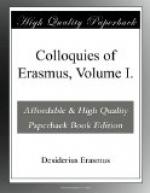Ch. Fare you well likewise, most learned Austin.
The RELIGIOUS TREAT.
The ARGUMENT.
This religious Treat teaches what ought to be the Table-Talk of Christians. The Nature of Things is not dumb, but very loquacious, affording Matter of Contemplation. The Description of a neat Garden, where there is a Variety of Discourse concerning Herbs. Of Marjoram, Celandine, Wolfs-Bane, Hellebore. Of Beasts, Scorpions, the Chamaeleon, the Basilisk; of Sows, Indian Ants, Dolphins, and of the Gardens of Alcinous. Tables were esteemed sacred by the very Heathens themselves. Of washing Hands before Meat. A Grace before Meat out of Chrysostom. Age is to be honoured, and for what Reason. The Reading of the Scriptures very useful at Meals. That Lay Persons may Discourse concerning the Scriptures. The 21st of Prov. and 1st Ver. illustrated. How God hates Sacrifices, in Comparison of Mercy, Hos. 6. No Body is hurt but by himself. That Persons in Wine speak true. That it was unlawful for the AEgyptian Priests to drink Wine. The I Cor. 6. opened. All Things are lawful for me. The Spirit of Christ was in the Heathens and Poets. Scotus is slighted in Comparison of Cicero and Plutarch. A Place is cited out of Cicero and Cato Major, and commended; dare omni petenti, give to every one that asketh, how it is to be understood. We ought to give to Christ’s Poor, and not to Monasteries. The Custom of burying in Churches blam’d. That we ought to give by Choice, how much, to whom, and to what End. We ought to deny ourselves of something that we may give it to the Poor. No Body can serve two Masters, is explained. A Grace after Meat out of St. Chrysostom.
EUSEBIUS, TIMOTHY, THEOPHILUS, CHRYSOGLOTTUS, URANIUS, SOPHRONIUS, EULALIUS, THEODIDACTUS, NEPHALIUS.
Eu. I admire that any Body can delight to live in smoaky Cities, when every Thing is so fresh and pleasant in the Country.
Ti. All are not pleased with the Sight of Flowers, springing Meadows, Fountains, or Rivers: Or, if they do take a Pleasure in ’em, there is something else, in which they take more. For ’tis with Pleasure, as it is with Wedges, one drives out another.
Eu. You speak perhaps of Usurers, or covetous Traders; which, indeed, are all one.
Ti. I do speak of them; but not of them only, I assure you; but of a thousand other Sorts of People, even to the very Priests and Monks, who for the Sake of Gain, make Choice of the most populous Cities for their Habitation, not following the Opinion of Plato or Pythagoras in this Practice; but rather that of a certain blind Beggar, who loved to be where he was crowded; because, as he said, the more People, the more Profit.




